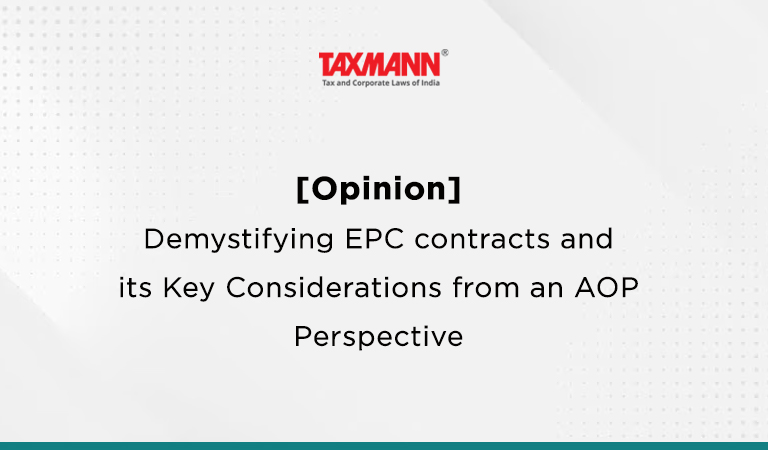[Opinion] Demystifying EPC contracts and its Key Considerations from an AOP Perspective
- Blog|News|Income Tax|
- 2 Min Read
- By Taxmann
- |
- Last Updated on 1 May, 2023
 CA Sahil Bansal & Ajay Sharma – [2023] 149 taxmann.com 438 (Article)
CA Sahil Bansal & Ajay Sharma – [2023] 149 taxmann.com 438 (Article)
EPC Contract
EPC stands for Engineering, Procurement, and Construction – a type of construction contract commonly used in the engineering industry where a single contractor is responsible for the entire project, from design and engineering to procurement of materials and equipment, construction and commissioning. EPC contracts are often called turnkey contracts because the contractor is obliged to handover the completed project to the owner in a condition where the owner can immediately start operating the facility.
How do these EPC contractors operate in India?
EPC contracts are a common practice for large and complex construction projects in industries like oil & gas, energy, and infrastructure. A consortium of entities with different expertise often joins forces to participate in the bidding process for such contracts. In India, government organizations like DMRC and NHSRC issue tenders for EPC contracts in public domain, ensuring transparency in the bidding process. Once a consortium wins the bid, they create a consortium agreement that outlines each member’s roles, responsibilities and terms of performance. The main contractor oversees the project, ensuring that it gets completed on time and within budget, while consortium members share obligations, risks and consideration. This approach enables effective collaboration, combining resources and expertise to deliver successful projects.
Nature of transactions involved in a typical EPC contract
- Offshore supply of goods – This may include equipment, machinery, or other materials required for the construction project. These goods may be sourced from foreign suppliers and imported into India.
- Procurement of goods from local vendor by Indian entities – The Indian members may procure goods or services required for the project from local vendors.
- Transfer of design from outside India – In some cases, the design of the project may be prepared by a foreign entity and transferred to the Indian consortium member for execution.
- Transfer of know-how or technology from outside India – The consortium may require specialized knowledge or technology from foreign entities to complete the project, which may be licensed or transferred to the consortium members.
- On-site training and supervision service provided by foreign member – In certain cases, the foreign consortium member may provide on-site training and supervision services to the Indian members for smooth execution of the project.
- Manufacturing and after sale support service in India provided by Indian entities – The Indian members may be responsible for manufacturing or assembling components required for the project and providing after-sale support services to the client.
Click Here To Read The Full Article
Disclaimer: The content/information published on the website is only for general information of the user and shall not be construed as legal advice. While the Taxmann has exercised reasonable efforts to ensure the veracity of information/content published, Taxmann shall be under no liability in any manner whatsoever for incorrect information, if any.

Taxmann Publications has a dedicated in-house Research & Editorial Team. This team consists of a team of Chartered Accountants, Company Secretaries, and Lawyers. This team works under the guidance and supervision of editor-in-chief Mr Rakesh Bhargava.
The Research and Editorial Team is responsible for developing reliable and accurate content for the readers. The team follows the six-sigma approach to achieve the benchmark of zero error in its publications and research platforms. The team ensures that the following publication guidelines are thoroughly followed while developing the content:
- The statutory material is obtained only from the authorized and reliable sources
- All the latest developments in the judicial and legislative fields are covered
- Prepare the analytical write-ups on current, controversial, and important issues to help the readers to understand the concept and its implications
- Every content published by Taxmann is complete, accurate and lucid
- All evidence-based statements are supported with proper reference to Section, Circular No., Notification No. or citations
- The golden rules of grammar, style and consistency are thoroughly followed
- Font and size that’s easy to read and remain consistent across all imprint and digital publications are applied



 CA | CS | CMA
CA | CS | CMA
